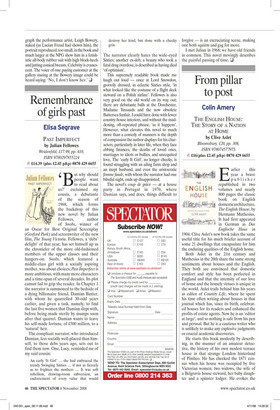Remembrance of girls past
Elisa Segrave
PAST IMPERFECT by Julian Fellowes Weidenfeld, £17.99, pp. 410, ISBN 9780297855224 V £14.39 (plus £2.45 p&p) 0870 429 6655 But why should people want to read about us?’ exclaimed my cousin, a debutante of the season of 1968, which forms the backdrop of this new novel by Julian Fellowes, author of Snobs, winner of an Oscar for Best Original Screenplay (Gosford Park) and screenwriter of the new film, The Young Victoria. Fellowes, a ‘debs’ delight’ of that year, has set himself up as the chronicler of the more old-fashioned members of the upper classes and their hangers-on. Snobs, which featured a middle-class girl with a socially aspiring mother, was about choices; Past Imperfect is more ambitious, with many more characters and a time-span of several decades. Its plot cannot fail to grip the reader. In Chapter 1 the narrator is summoned to the bedside of a dying billionaire friend, Damian Baxter, with whom he quarrelled 30-odd years earlier, and given a task, namely, to find the last five women that Damian slept with, before being made sterile by mumps soon after that quarrel. Damian wants to leave his self-made fortune, of £500 million, to a ‘natural’ heir.
The compliant narrator, who introduced Damian, less socially well-placed than himself, to those debs years ago, sets out to find them now. One, Lucy, reminded me of my said cousin:
An early ‘It Girl’ ... she had embraced the trendy Swinging Sixties ... if not as fiercely as to frighten the mothers ... It was soft rebellion, drawing-room subversion, an endorsement of every value that would destroy her kind, but done with a cheeky grin.
The narrator clearly hates the wide-eyed Sixties; another ex-deb, a beauty who took a fatal drug overdose, is described as having died ‘of optimism’.
This supremely readable book made me laugh out loud — once at Lord Snowdon, groovily dressed, in eclectic Sixties style, ‘in what looked like the costume of a flight deck steward on a Polish airline’. Fellowes is also very good on the old world on its way out; there are debutante balls at the Dorchester, Madame Tussauds and the now obsolete Battersea funfair. I could have done with fewer country-house interiors, and without the maddening, oft-repeated phrase, ‘as it happens’. However, what elevates this novel to much more than a comedy of manners is the depth of compassion the author displays for his characters, particularly in later life, when they face ebbing finances, the deaths of loved ones, marriages to idiots or bullies, and unrequited love. The ‘early It Girl’, no longer cheeky, is found struggling with an ailing farm shop and an inept husband, and even the aristocratic femme fatale, with whom the narrator had one blissful night, ends up disappointed.
The novel’s coup de grâce — at a house party in Portugal in 1970, where Damian says, and does, things difficult to forgive — is an excruciating scene, making one both squirm and gag for more.
I met Julian in 1968; we have old friends in common. This novel movingly describes the painful passing of time. ❑


















































































 Previous page
Previous page